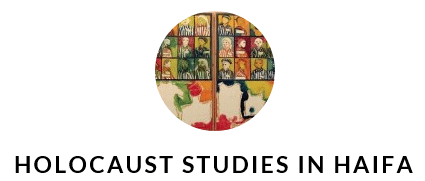The Weiss-Livnat International MA Program in Holocaust Studies at the University of Haifa Blog

My name is Lindsay Shapiro, and I was born and raised in Tampa, Florida. I graduated from New York University in 2012 with a BA in History/Hebrew and Judaic Studies. While a student at NYU, I worked at the Bronfman Center for Jewish Life, Bar Ilan University, Interfaith Living Museum, and Center for Jewish History. I also worked as a Lipper Fellow at The Museum of Jewish Heritage: A Living Memorial to the Holocaust, teaching middle- and high-school students about the Holocaust, both in the Museum and in schools. I recently made aliyah after living in the United States for the first 25 years of my life. I live in Tel Aviv with my husband, Liran, and Jack Russell-mix dog, Pizza.
There were many factors that led me to the Weiss-Livnat MA program in Holocaust Studies. For one, I grew up fascinated with the Holocaust- reading books, watching movies, asking about it in school from a pretty young age. Before college, I had a very emotional education of the Shoah; one of victimhood and fear. While at NYU, at the beginning of a course on the Third Reich and the Jews, my professor told everyone, “If you’re here to see gruesome pictures and hear sad stories, this is not the class for you. We will be looking at this subject objectively, to figure out how a society could exterminate 12 million people in less than a decade, half of them Jews. We are going to learn the facts.” The idea of looking at the Holocaust from a scholarly and objective, point of view was eye opening and very appealing.

So far, my first semester in the MA program has been great. Coming to study in Haifa was a big change from studying at NYU. The campus feel here is something I hadn’t really experienced before. The mountain and sea views of Haifa are much different than the skyscrapers of NYC, and it’s something I think I can get used to!
One of my favorite parts of the program so far is getting to learn alongside my peers in our 2015-16 cohort. Everyone is coming to study from different parts of the world, different personal backgrounds and different fields of study, which adds a tremendous amount of depth to discussions in and out of classes. My professors are experts in their field, and are very passionate about what they’re teaching. It makes my days with almost 8 hours of lectures interesting.
I’ve recently become more interested in Holocaust research and diplomacy, and am excited to explore these ideas in the program. I’m very interested in relationships between Germany and Israel, as well as between Germany and the rest of the Jewish world. As I mentioned, I grew up in an American Jewish community, and was taught to treat certain countries with fear and hesitancy because of their actions during the Shoah. Having grown up and learned more about the Holocaust I don’t think this is fair, and I hope that my experience in the program can help me learn more about how to fix that perception in my home community. I believe that working together with countries like Germany and Poland on Holocaust research can improve future relationships between the citizens of these countries. As an olah and Zionist, I’m also interested in European Zionist movements, before and during the Second World War, and what their role may have been in survival rates amongst Jewish communities in Nazi-occupied countries.
Learning German here in Israel is especially meaningful. Even though my family was fortunate enough to come to America from Europe in the 1910s, the cities we discuss in class are cities they once lived in. On a personal level, I think the transition of the Jewish people from mass destruction to, 70 years later, the modern State or Israel is incredible.
At times, it’s difficult not to get too emotionally invested in the subject matter and to maintain objectivity. It’s painful to learn about the hundreds of destroyed communities in Eastern Europe, from where my great-great grandparents came, and know that ‘returning home’ to see my family’s roots will most likely lead to nothing; no traces of them, destroyed Synagogues and cemeteries, and an unfamiliar culture. Despite that odd sense of melancholy, it makes me happy and proud to think about Israel today, and to know that I’m learning about the Holocaust with non-Jewish students from these same places who came to study in Israel as well. I’m thankful that the State of Israel exists now, and I am hopeful that one day my peers and I will add to the immense amount of Holocaust research and work done here in Israel.
Interested in applying for our MA in Holocaust Studies Program? You can find the application and more information at our website:
 http://holocaust-studies.haifa.ac.il/
http://holocaust-studies.haifa.ac.il/
 “Die Welt”: Terroryzm w wierszach polskiej noblistki
“Die Welt”: Terroryzm w wierszach polskiej noblistki






